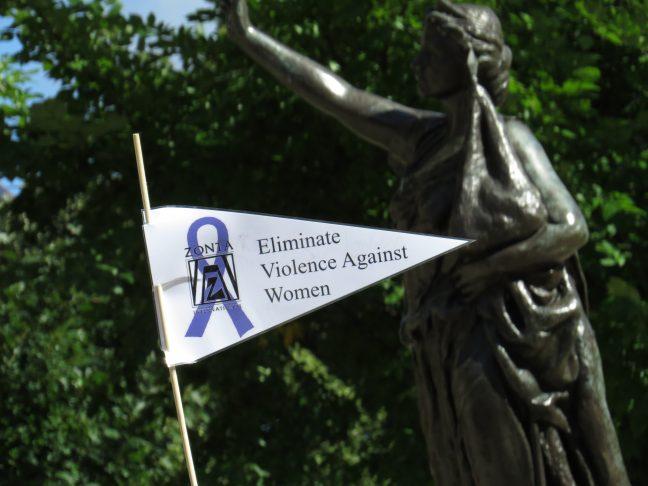Intimate partner violence will affect one in five undergraduate relationships at the University of Wisconsin.
According to a 2015 Association of American Colleges and Universities survey, more than 20 percent of UW undergraduate students reported they had been in a violent relationship since entering college. Of the students who reported, 30 percent did not tell any one about it.
Domestic violence
Darald Hanusa, a UW School of Social Work senior lecturer and founder of Alternatives and Treatment for Abusive Men, said intimate partner violence, which is defined as a violent relationship between two people and does not require the two to be in a shared living situation, relies on power and control. Emotional abuse, manipulation, name calling, sarcastic comments, the silent treatment, threats and physical abuse all serve as tactics for the perpetrator to maintain control over the victim.
“The core of domestic violence is about oppression,” Hanusa said. “One group makes it clear to the other group that they will do whatever it takes to make sure that they are not safe so that they can continue to abuse them.”
Through her time working with domestic abuse and sexual assault victims in the community and on campus, Carmen Juniper Neimeko, manager of End Violence On Campus, discovered domestic violence is dealt with differently for each level of severity. She said the U.S. has stepped up to create services and enact laws since the 1970s to protect domestic violence victims but was slower to react to sexual assault victims.
While the U.S. as a whole was slower to react to sexual assault victims with legislative action, college campuses have experienced the reverse. For the past 15 years, campuses have worked to address sexual assault as an emergency issue and an ongoing chronic health concern. But because dating violence is usually ongoing and not a one-time incident, Neimeko said it typically does not fit into the crisis mold, causing it to take a “back seat” on college campuses.
Rejecting silence: Student survivors take control, speak out on sexual violence
“What we know about dating violence is that there might [be] repeated and escalating … warning signs that are working in concert and all part of the abuse, like ongoing emotional abuse, isolation and manipulation — and it can be difficult for individuals and systems to identify and respond to that behavior in the same way they would as a single event crisis,” Juniper Neimeko said. “But it doesn’t make dating violence any less of a concern than sexual assault.”
The emotional investment
Sophie Nielsen, former chair of Promoting Awareness, Victim Empowerment, said the organization is working to create a conversation on campus focused on healthy masculinity and femininity. She said parents model relationships for their children but when it comes to domestic violence, poorly parental modeled behavior is not all that is to blame.
Nielsen said close adherence to societal gender norms, which excuse men from certain work while forcing women to do it, leads to unhealthy relationships that are reinforced by media.
Hollywood encourages unhealthy relationship expectations, Juniper Neimeko said.
“[Mainstream romantic comedies are] about a relentless pursuit,” Juniper Neimeko said. “In them, women are portrayed as not knowing what they want and are only happy when they allow themselves be ‘romanced,’ which looks like being stalked, manipulated and tricked by the guy who finally gets the girl.”
Hanusa said the emotional investment and trained manipulation often keep the victim hanging on to her perpetrator, unable to leave. The victim is often reluctant to tell other people about the abuse because of embarrassment and the perpetrator’s ability to win over people outside of the relationship, making the victim feel to blame for her abuse.
Advocating against violence
Madison Police Department captain Brian Ackeret said MPD employs the same pro-arrest strategy for every violent relationship — even for couples who don’t live together — despite state statute narrowly defining domestic violence as only referring to adults who live together or have lived together.
Officers are trained to recognize that by the time they get to a scene, the perpetrator may have already calmed down and created a story while the victim may still be upset, Ackeret said. The responding officer completes a danger assessment with victims to determine how dangerous the perpetrator is to the victim and what course of action to take.
Ackeret said the department partners with Domestic Abuse Intervention Services of Dane County to give victims advocates who follow up with them after an incident.
EVOC provides confidential victim advocacy and acts as a source of support and information for friends or family of the victims. Juniper Neimeko said that since abusers often isolate victims, it can be difficult for them to reach out for help.
“Friends are such an important part of a survivor’s support system, and we encourage them to allow victim to speak and heal without judgement or conditions,” Juniper Neimeko said.
If you are in a violent relationship and need help, call (608) 251-4445 for assistance from Domestic Abuse Intervention Services.


